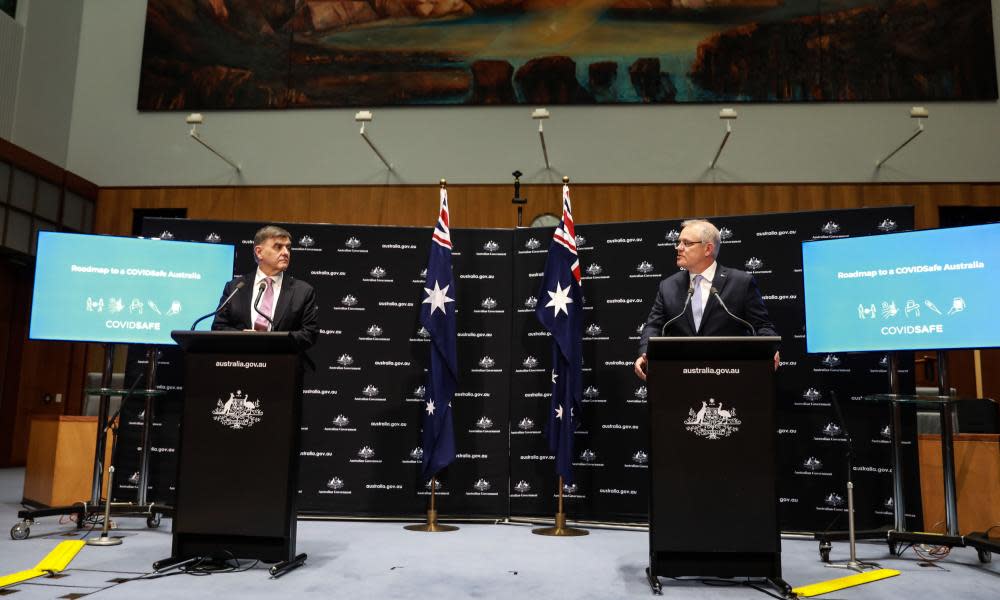Essential poll: Scott Morrison's handling of Covid-19 continues to win approval

Scott Morrison’s management of Covid-19 is continuing to win approval from voters, including more than half of Labor voters in the latest Guardian Essential survey, although the prime minister’s emphatic political rebound from the debacle of the January bushfires may be plateauing.
With the government preparing to unveil another economic stimulus package later this week, the latest survey of 1,059 respondents has Morrison’s approval rating up for the fifth straight month, but the positive movement this month is inside the poll’s margin of error.
Morrison’s approval stands at 65%, compared with 39% at the tail end of Australia’s catastrophic summer, 41% in March, 59% in April and 64% last month. As well as the steady uptick in approval, responses to questions about the prime minister’s professional attributes and character also plot Morrison’s significant political recovery during the past six months.
Related: Essential poll: one in 10 Australians who have lost jobs fear they won't work again
In January, only 32% of the sample rated the prime minister good in a crisis, and that’s now up to 66% – a 34 point turnaround. Less than half the sample rated Morrison as a capable leader (45%) in January and that’s now up t0 70%. There has also been a 16-point increase in perceptions of Morrison’s trustworthiness (40% in January, 66% now). Before the bushfires, in October 2019, 51% of the Guardian Essential sample thought Morrison good in a crisis, 54% thought he was a capable leader, and 43% considered him trustworthy.
Morrison currently enjoys approval from 89% of Coalition voters, 53% of Labor voters, 41% of Greens voters and 57% of people intending to vote for someone other than the major parties. His negatives have also dived. In January, 52% of the sample disapproved of the prime minister’s performance, and that’s down to 26% in the current survey.
The prime minister lost his lead on the head-to-head “preferred prime minister” measure in January during the sharp voter backlash about the fires, and the slump was sustained. In February, Morrison and the Labor leader Anthony Albanese were level pegging on 36%, and the prime minister did not regain the lead until March.
In the latest poll, Morrison is comfortably in front of Albanese on the preferred prime minister measure – 53% to 23% – but around a quarter of the sample remains on the fence.
Morrison enjoys strong majority support among Coalition rusted-ons, with 84% of Coalition voters rating him their preferred prime minister, but Albanese is yet to command the same level of loyalty from his base. Just under half of Labor voters in the Guardian Essential sample think Albanese would make the better prime minister (45%) compared to Morrison (29%), with 27% of the cohort yet to decide whom they prefer.
Related: Guardian Essential poll: Australians more comfortable with easing of coronavirus rules
Albanese’s approval ratings have been steady over the first six months of 2020. In January, 43% approved of his performance and 30% disapproved, and that result is the same in the current poll.
Only 8% of the sample don’t know whether they approve or disapprove of Morrison’s performance, but the undecided cohort is significantly higher with Albanese at 26%. In January, the undecideds was 27% of the sample.
Like Morrison, Albanese has also made gains on the attributes questions since they were last put to survey respondents in October 2019, although the Labor leader’s improvements are more modest. Since last October, Albanese is more likely to be positively associated with “understands the problems facing Australia” (up 9%), “trustworthy” (up 7%) and “good in a crisis” (up 7%).
Polling undertaken during the Covid-19 crisis suggests Australians have regained some trust in politics and institutions because of the competent management of the pandemic by the nine governments of the federation.
While the response to the crisis has been demonstrably more effective in Australia than in many countries, not everything has been seamless. Just over a week ago, Treasury acknowledged the jobkeeper wage subsidy program would now cost the budget $70bn rather than $130bn because of a reporting error in estimates of the number of employees likely to access the scheme, and because the impact of Covid-19 on the economy had not been as severe as expected.
Survey respondents were divided about whether the error reflected negatively on the Morrison government’s credibility, with 43% saying it did not, and 41% believing it did.
Voters in the survey are more likely to want to bank the unanticipated saving than spend it. A third of the sample wants to extend jobkeeper, a further 20% wants the eligibility criteria broadened – while 45% wants the money to be put towards reducing the national debt.
Aspirations differ depending on the age group. Voters under 34 are more likely to want to spend the windfall on extending or broadening the scheme, compared with voters over the age of 55.
With state governments now winding back the initial public health restrictions imposed to flatten the curve of Covid-19 infections, the survey also points to a slight uptick in community anxiety about the risk of catching the virus, with 32% saying they are very concerned about the threat compared with 30% a month ago, and a two point increase in people saying they are very likely to contract the illness.
The margin of error for the poll is plus or minus 3%.

 Yahoo News
Yahoo News 
